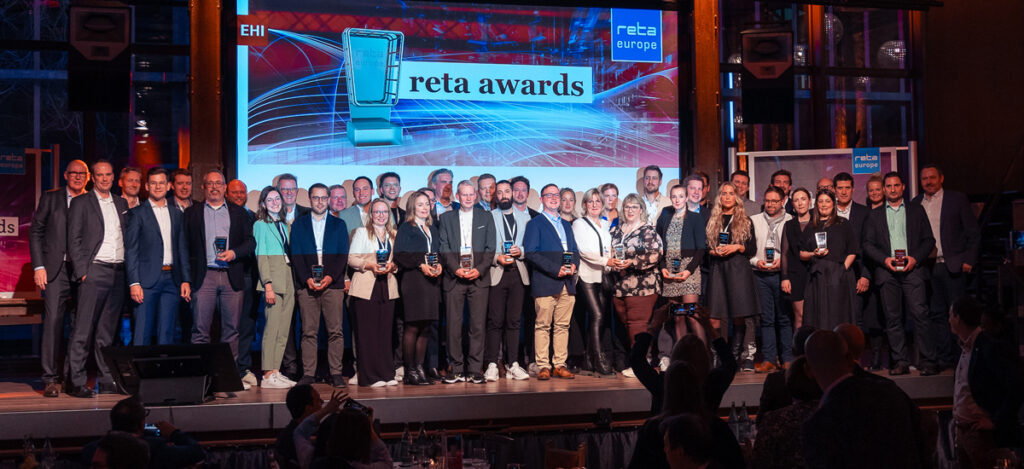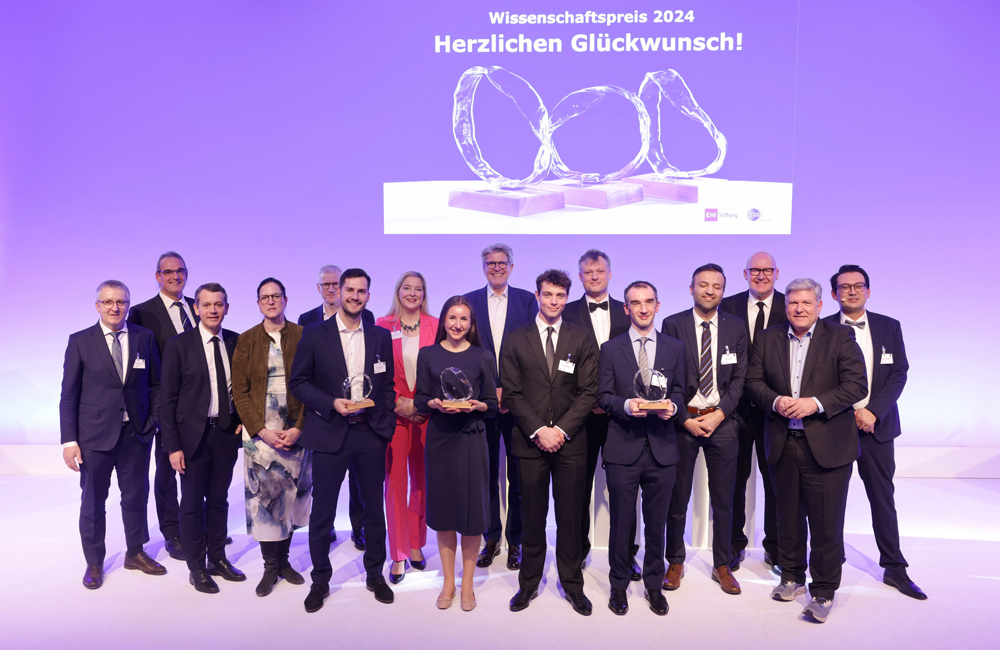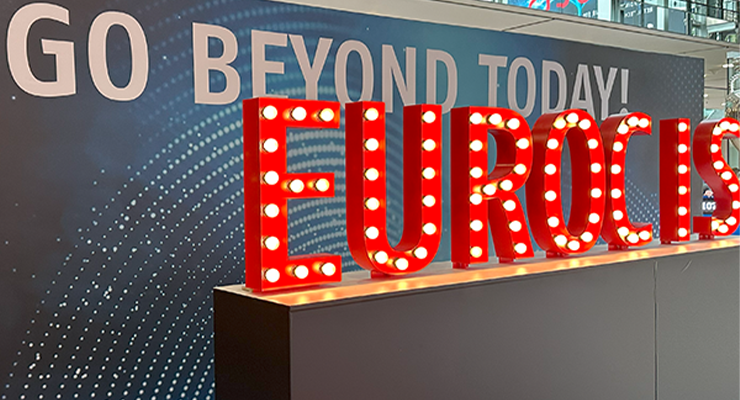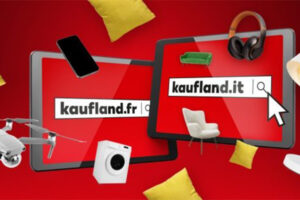This time, 13,500 professionals from 95 countries visited the exhibition center to discover the latest innovations and technology trends in retail. This was a new record number of visitors. In addition to the 475 exhibitors from 41 countries, there was also a start-up hub with innovative and creative products and services. Knowledge was imparted in condensed form on the 3 stages: Experts gave presentations and were available to answer questions. Basically, everyone agreed that the future of retail lies in technology, innovation and AI solutions and that checkout solutions, merchandise security, IT infrastructure and process optimization are becoming increasingly important.
Also the supporting program was an absolute highlight:

Credit: EHI
Das EHI Retail Institute honoured the winners of the Retail Technology Awards “Reta” for the 17th time as part of Eurocis 2024. Fifteen outstanding retail technology solutions were recognised in five different categories:
Best Customer Experience
Eintracht Frankfurt with Payfree
Eintracht Frankfurt has opened the German Bundesliga’s first cashierless fan shop in 2022. In the 30 square metre store, which is open on home match days in the immediate vicinity of the stadium, fans can pay quickly and contactlessly by card or smartphone. The RFID-tagged fan merchandise is simply swiped through a U-shaped scanner.
Edeka’s Netto with Wanzl
Netto Marken-Discount has introduced a new shopping trolley system in line with the cashless trend. Customers can unlock their shopping trolleys using an app and NFC technology, meaning that conventional coins are no longer required.
Tegut with Autonomo and Snabble
Tegut has taken its unmanned Teo-Ministore concept to a new level at the TU Darmstadt site. The innovative approach includes Grab & Go and Tap & Go functions that meet today’s customer needs. The cashierless smart store offers a complete checkout solution from Snabble in the background, where all software threads come together. Tegut was also the first company in Germany to introduce Tap & Go at Teo: It offers the same seamless shopping experience without the need for an app to enter the store.
Best Instore Solution
Douglas with Samsung and Komsa Services
Douglas has introduced Samsung XCover phones and complementary software to improve their in-store processes and is pioneering the use of the smartphone as an all-in-one mPOS device, enabling Girocard payments on the shop floor. The integration of omnichannel services onto the shop floor ensures seamless operations, allowing out-of-stock items to be conveniently delivered to customers’ homes. Having started in Germany the company has rolled out nearly 2500 devices providing 13 processes and service-based applications in 3 countries.
E-Center Warnow with Captana
E-Center Warnow Park, northern Germany’s largest Edeka store with 8500 sqm, has introduced Captana’s shelf-edge camera solution to increase operational efficiency. In combination with cameras and electronic shelf labels (ESLs), the system captures real time shelf data. Captana also helps the retailer to optimise processes and staff deployment and increase customer satisfaction. Within two months, E center Warnow Park was able to increase its merchandise availability by 3 percentage points.
Leroy Merlin with Hanshow
Leroy Merlin aims to bridge the gap between the digital and physical worlds to make it easier for customers to navigate. In addition to installing state-of-the-art electronic tags, Leroy Merlin implemented features such as up-to-date pricing information linked to the e-commerce website and customer reviews to better support shoppers. Leroy Merlin also introduced a range of functionalities that improved both staff efficiency and the overall in-store customer experience.
Best Enterprise Solution
Rewe Group with Flip
Rewe Group has introduced an app for its employees that enables direct communication between store staff as well as managers, their teams, and the head offices throughout Germany. This improves the retailer’s multi-shift operations. In addition, the app offers Rewe employees’ access to news and information, a learning platform and digital shift schedules. The employee app Flip serves as a catalyst for efficient, collaborative, and innovative workplace communication.
Schwarz IT with Things Board
With the IoT Schwarz platform, Schwarz Group is tackling the complexity of the variety of technical equipment in food retail outlets. Schwarz IT relies on the Things Board platform from the provider of the same name, which standardizes technologies and use cases in over 13,000 stores in 32 countries. This gives each store customized and authorized access to its data. The IoT portal acts as a visualization layer, providing all the data from the affected devices to the responsible parties so that they can quickly analyze the causes of the faults. More than 500,000 individual devices are currently connected to the platform, which also accelerates the digitization process itself by reducing the number of interfaces between data consumers and devices.
Würth with an in-house development
Würth has developed the voice and chat assistant Pico, which speeds up important sales processes. The digital assistant processes user enquiries in real time and provides information and documents via voice or chat. Pico is therefore able to take over simple, repetitive tasks for field and office staff – around the clock.
Best Connected Retail Solution
Benetton with Cegid
Fashion company Benetton has implemented Cegid Retail’s cloud-native POS and unified commerce platform to create a seamless omnichannel shopping experience. Benetton is using the solution globally to unify sales channels, optimize inventory and personalize interaction with the brand. The project is marking a significant leap forward for Benetton Group’s digital retail strategy.
Edeka Südwest with Liquam, Avenit, Blackforestbytes and Maexware Solutions
Edeka Südwest has developed a shop eco-system that covers various multichannel e-commerce activities for independent retailers. The system includes click & collect, delivery to end consumers, 24/7 stores and a drive-through. The aim is to streamline processes and ensure flexibility and efficiency across various e-commerce models for independent Edeka retailers. The shop eco-system centers on the Oxid eSales eCommerce platform.
Markant with Adesso
Markant has created a European B2B platform with which numerous processes between upstream suppliers, the consumer goods industry and retailers along the value chain can be bundled, centrally regulated, and optimally managed. The platform offers a standardised user interface. Platform partners can also offer their own services on the platform and thereby generate revenue. Markant built the platform in an 11-month journey with development partner Adesso. The ‘Cartridge architecture’ enables quick integration of third-party services, positioning Markant as a market leader in pioneering collaborative solutions.
Best AI & Robotics Application
Colruyt with Colruyt Group Smart Technics
Colruyt has introduced an AI-based checkout system at its Lowest Prices store in Halle, Belgium, which can automatically scan products as employees move them from one shopping trolley to another. The system is claimed to increase the efficiency of the checkout process by up to a fifth. It consists of a camera and two large LED lights installed above the checkout area. The AI-powered camera recognizes up to 85% of products, distinguishing and choosing the correct bar code even on multi-packs.
dm Drogeriemarkt and dm Tech with Ubica Robotics
The autonomous shelf-scanning robots from Ubica Robotics use cameras and sensors as well as classic and AI-based image processing algorithms to create accurate, efficient and comprehensive digital twins of dm stores. The robots are developed by Ubica, an award-winning high-tech spin-off from the University of Bremen’s Institute for Artificial Intelligence. Gaps in shelf availability are recognised automatically and the need for manual stock checks is reduced. A smartphone-based product finder helps employees locate products more efficiently during tasks such as replenishment and order commissioning. The data collected is continuously analysed to improve shelf replenishment, optimise stock management, and offer customers a better shopping experience.
Kaufland Stiftung with BSS Bohnenberg GmbH
Kaufland has introduced an automatic picking system, particularly in the fruit and vegetable department, that depalletizes boxes from pallets in a semi-automatic process. The system relieves employees by pulling and pushing instead of lifting to move the boxes. Introducing the system makes retail workstations significantly more ergonomic. The solution ensures an optimised pallet structure and reduces downtime due to breakage or spoilage to a minimum. The focus here is on reducing the workload for employees, rapid availability for customers, reliability, and scalability. The technology service provider is BSS Bohnenberg GmbH.

Credit: EHI/GS1/Jörn Wolter
The Science Award 2024 was also presented at EuroCIS 2024. Around 250 top professionals accepted the invitation from the EHI Foundation and GS1 Germany to attend the 17th Science Award ceremony at EuroCIS in Düsseldorf. The best startup, the best dissertation and the best master’s thesis were honored:
The best start-up was Murmuras GmbH, an on-screen technology for measuring consumption across all apps. (University of Bonn) Read more here.
The best dissertation was written by Dr. Jannik Rößler, University of Cologne. Here is the link for more information. The title of the thesis: “Optimizing Uplift Modeling to Improve Treatment Assignment Problems.”
Elina Porz at the Vienna University of Economics and Business wrote the best master’s thesis with the title: “Consumer preferences and willingness to pay for virtual fashion – A choice-based conjoint analysis on brand choice in the Metaverse” at the Vienna University of Economics and Business. The summary is here.
The next EuroCis will take place in Düsseldorf from February 18-20, 2025.







